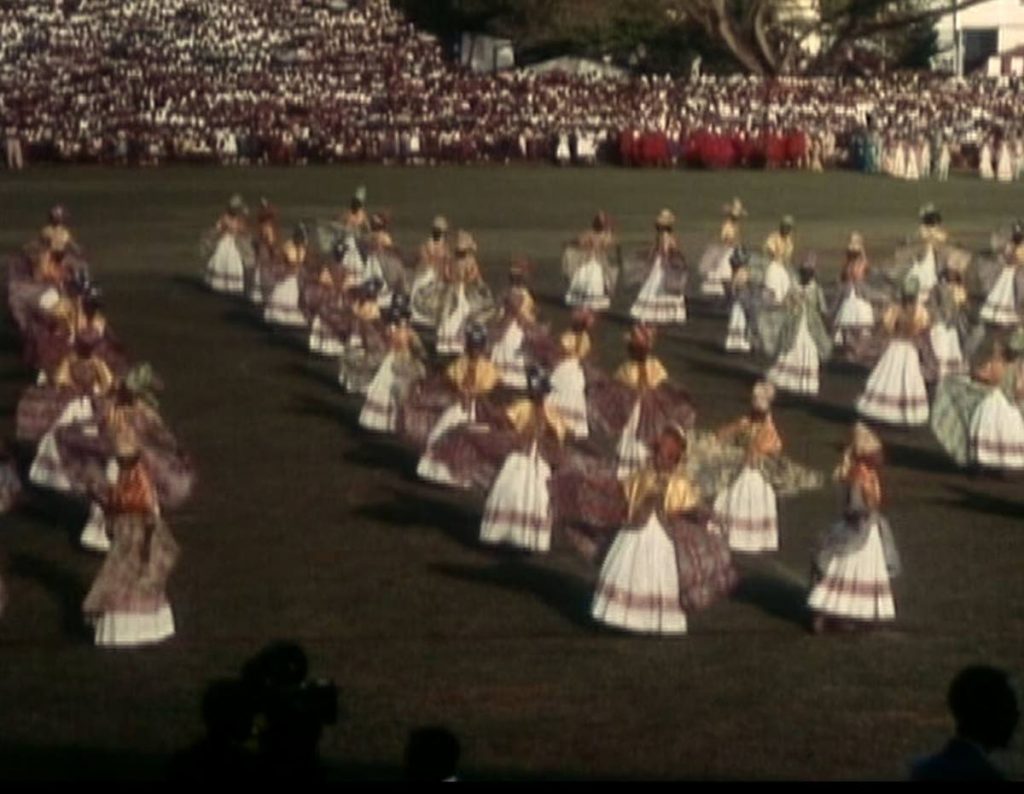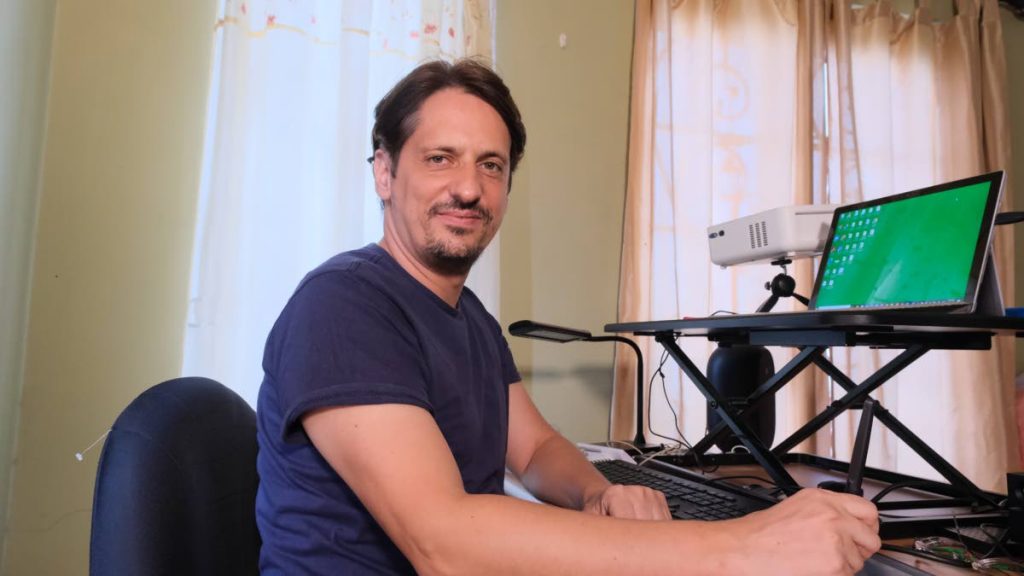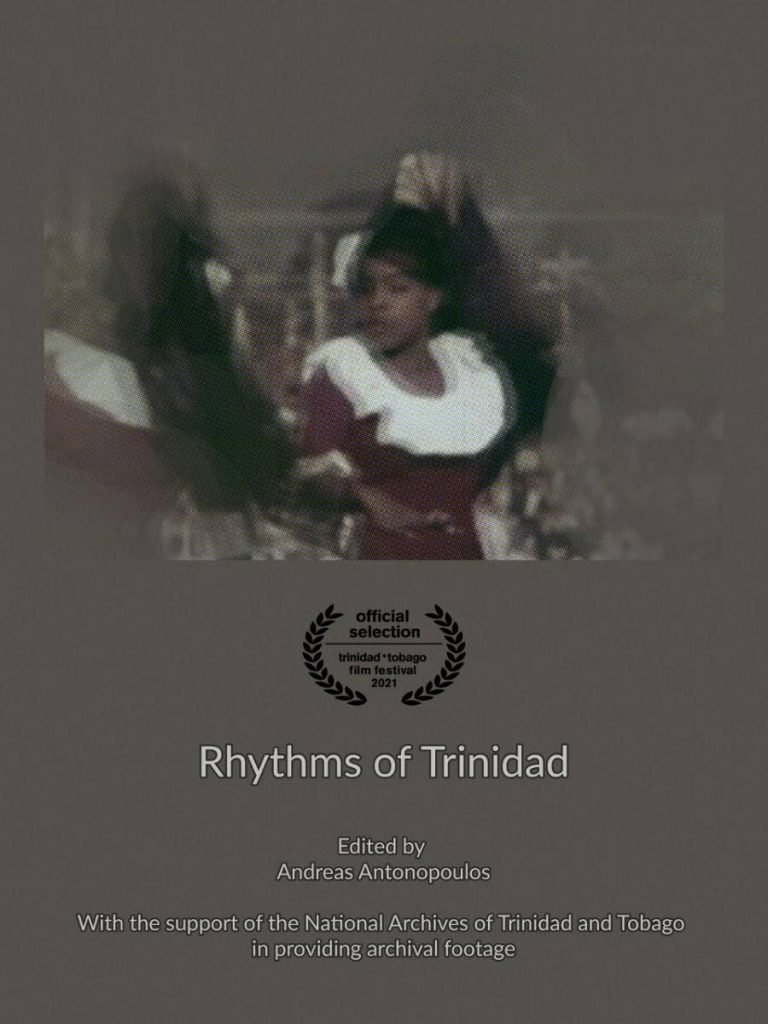Greek filmmaker's Rhythms of Trinidad wins best new media award

Using both black and white, and colour video clips, filmmaker Andreas Antonopoulos takes his audience back in time, giving them a glimpses of TT many alive today have never seen.
A lecturer in the University of the West Indies’ Film Programme for the past two and a half years, Antonopoulos won the best new media award at the 2021 TT Film Festival with his ten-minute experimental documentary, Rhythms of Trinidad.
With assistance from the National Archives of TT, he wove a story of everyday life and culture.
There were images of people in groceries, military parades, men and women working in factories, working machinery at manufacturing plants, construction, Carnival, still advertisements, houses, trolleys moving along tramways on the roads, beasts of burden pulling a cart of sugarcane and more.
Interwoven between these images were dancers performing in costume – Spanish, Indian, African, and bele – and a slightly eerie score.
He told Sunday Newsday he was amazed that he won because, after working so long and hard on the film – going through 12 hours of archives, selecting clips, breaking them down and editing it down to ten minutes – all he was hoping to do was to show his work to an audience.
He said when films are made, the creators have no idea how audiences would receive them. People usually do not make films for themselves but for an audience so, in discussing his work at the film festival, he was glad to know people liked and understood what he was trying to do, which was his biggest reward.
It was also a pleasure to see some of his students’ work at the festival. He said it feels good when their screenings are successful and people appreciate their creativity. He is also proud because three films from his students were selected to be screened at a film festival in Germany in November.

Born in Athens, Greece, he attended film school at the University of Athens and, with a full scholarship, went on to do his master's in film at the Screen Academy Scotland in Edinburgh.
Since then, he has been making films while teaching at Napier Edinburgh University and Leeds Beckett University in the UK, before being invited to teach at UWI.
He said in high school, he spent a lot of time watching films and wondered how they were made so he went to film school as he did not have any other interests.
“After graduating, I spent a lot of time working in the media industry in Athens, mostly as an editor, which was great, but it was not for me. I wasn’t sure what I would find when I left Athens but I discovered there was more to do as an academic so when I went to the UK I focussed on teaching although I also like research and anything to do with academia.”
New Media is a broad term that could include anything produced for non-traditional media or for digital distribution, for example streaming and virtual reality.
Rhythms of Trinidad is a project Antonopoulos started two years ago. It is made completely of archival material that has not been often viewed. There was no script, no narration, no interviews, no speaking at all.
It has also been selected for screening at the 2021 Society for Visual Anthropology Film and Media Festival in the US.
“My intension was to explore new ways to make a film. There is a link between the clips but there is not a narrative plot and there are no statements. If I were to just have a voiceover and explain to people what I’m thinking, that has no value.
“What I did was to put fragments of history and fragments of culture and I linked them with the concept of movement and rhythm to communicate information. That’s why I used so much dance.”

He said history is complicated as there can be several views depending on who tells it, their reasons for telling it, their perspective, and political ideas. They also have to make it in a way everyone could understand.
With this in mind, he wanted to stay away from political leanings but he used juxtaposition to show some of the differences in society at that time. So, instead of stating anything, the film challenges the viewer to come to their own conclusions.
Previously, Antonopoulos’ work was mostly on fiction films, but he dabbled in experimental and animation as well.
His films have been screened at international film festivals all over the world including Korea, Switzerland, Germany, Greece, Bangladesh, Slovenia, Italy, the UK and now, TT.
He said he went through different phases, trying things throughout his career, to discover what he is most interested in.
He describes his work in TT as a turning point because here is where he started working on documentaries.
“I realised I could express the same things by doing documentaries as doing fiction. Making fiction films is very complicated and you could spend so much time and at the end it could take a completely different direction or it could not work and nothing would happen with it.

“But making documentaries is much more pragmatic. You can actually go outside and make it. You don’t have to worry about actors, big budgets, clothes, and the like. So, I made the decision to start working in the field of experimental documentary, ethnography in particular.”
Ethnography is the systematic study of individual cultures from the point of view of the subject of the study.
In that vein, he has finished shooting and is in the post-production stage of the feature documentary Cheenee, which is “sugar” in Sanskrit. The collaboration with Dr Deboleena Paul, Instructor in Indian Dance at UWI, should be completed by the end of the year.
He spoke to historians, to first and second generation descendants of people who came to Trinidad from India, and integrated dance and music into the film.
He explained that he is doing academic research on visual rhythm.
“So, my films, at this point, are very connected to, influenced, inspired by theories – dance theories, architecture theories. There is something called rhythm analysis which is an academic concept to explore history and culture through movement. So, I take these kinds of concepts and convey them into film.”
He said his main interest in films is political science and media theories – how mass media affects people’s lives and the expression of ideas and concepts. Therefore, he never saw himself as part of the film industry as he just wanted to explore and experiment with new ideas in filmmaking and express himself outside of conventional methods.

Comments
"Greek filmmaker’s Rhythms of Trinidad wins best new media award"